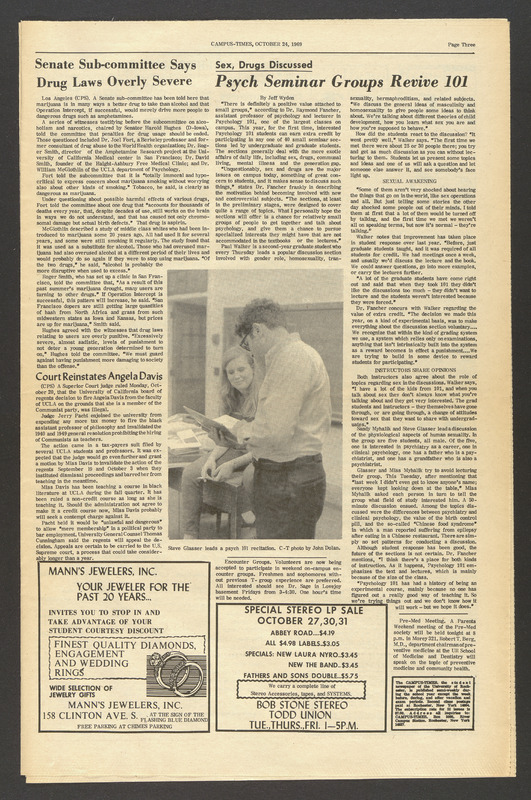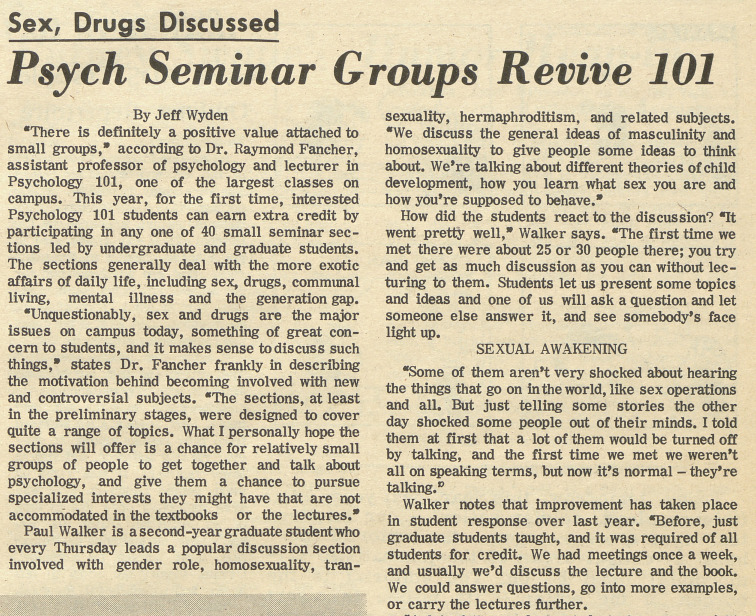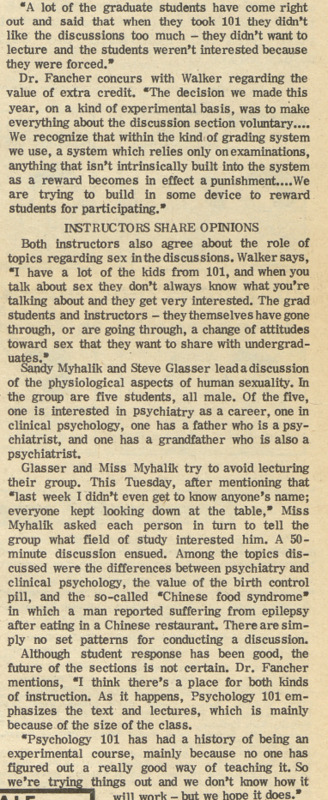-
Title
-
"Sex, Drugs Discussed- Psych Seminar Groups Revive 101"
-
Description
-
Campus Times (October 24, 1969), Page Three
-
Date
-
1969-10-24
-
Text
-
"There is definitely a positive value attached to small groups,” according to Dr. Raymond Fancher, assistant professor of psychology and lecturer in Psychology 101, one of the largest classes on campus. This year, for the first time, interested Psychology 101 students can earn extra credit by participating in any one of 40 small seminar sections led by undergraduate and graduate students. The sections generally deal with the more exotic affairs of daily life, including sex, drugs, communal living, mental illness and the generation gap.
“Unquestionably, sex and drugs are the major issues on campus today, something of great concern to students, and it makes sense to discuss such things,” states Dr. Fancher frankly in describing the motivation behind becoming involved with new and controversial subjects. “The sections, at least in the preliminary stages, were designed to cover quite a range of topics. What I personally hope the sections will offer is a chance for relatively small groups of people to get together and talk about psychology, and give them a chance to pursue specialized interests they might have that are not accommodated in the textbooks or the lectures.”
Paul Walker is a second-year graduate student who every Thursday leads a popular discussion section involved with gender role, homosexuality, trans-sexuality, hermaphroditism, and related subjects. “We discuss the general ideas of masculinity and homosexuality to give people some ideas to think about. We’re talking about different theories of child development, how you learn what sex you are and how you’re supposed to behave.”
How did the students react to the discussion? “It went pretty well,” Walker says. “The first time we met there were about 25 or 30 people there; you try and get as much discussion as you can without lecturing to them. Students let us present some topics and ideas and one of us will ask a question and let someone else answer it, and see somebody’s face light up.
SEXUAL AWAKENING
“Some of them aren’t very shocked about hearing the things that go on in the world, like sex operations and all. But just telling some stories the other day shocked some people out of their minds. I told
them at first that a lot of them would be turned off by talking, and the first time we met we weren’t all on speaking terms, but now it’s normal — they’re talking.”
Walker notes that improvement has taken place in student response over last year. “Before, just graduate students taught, and it was required of all students for credit. We had meetings once a week, and usually we’d discuss the lecture and the book. We could answer questions, go into more examples, or carry the lectures further. “A lot of the graduate students have come right out and said that when they took 101 they didn’t like the discussions too much — they didn’t want to lecture and the students weren’t interested because they were forced.”
Dr. Fancher concurs with Walker regarding the value of extra credit. “The decision we made this year, on a kind of experimental basis, was to make everything about the discussion section voluntary.... We recognize that within the kind: of grading system we use, a system which relies only on examinations, anything that isn’t intrinsically built into the system as a reward becomes in effect a punishment....We are trying to build in some device to reward students for participating.”
INSTRUCTORS SHARE OPINIONS
Both instructors also agree about the role of topics regarding sex in the discussions. Walker says, “I have a lot of the kids from 101, and when you talk about sex they don’t always know what you’re talking about and they get very interested. The grad students and instructors — they themselves have gone through, or are going through, a change of attitudes towards sex that they want to share with undergraduates
Sandy Myhalik and Steve Glasser lead a discussion of the physiological aspects of human sexuality. In the group are five students, all male. Of the five, —one is interested in psychiatry as a career, one in clinical psychology, one has a father who is a psychiatrist, and one has a grandfather who is also a psychiatrist. Glasser and Miss Myhalik try to avoid lecturing their group. This Tuesday, after mentioning that “last week I didn’t even get to know anyone’s name; everyone kept looking down at the table,” Miss Myhalik asked each person in turn to tell the group what field of study interested him. A 50-minute discussion ensued. Among the topics discussed were the differences between psychiatry and
clinical psychology, the value of the birth control pill, and the so-called “Chinese food syndrome® in which a man reported suffering from epilepsy after eating in a Chinese restaurant. There are simply no set patterns for conducting a discussion.
Although student response has been good, the future of the sections is not certain. Dr. Fancher mentions, “I think there’s a place for both kinds of instruction. As it happens, Psychology 101 emphasizes the text and lectures, which is mainly because of the size of the class.
“Psychology 101 has had a history of being an experimental course, mainly because no one has figured out a really good way of teaching it. So we’re trying things out and we don’t know how it will work — but we hope it does.”






